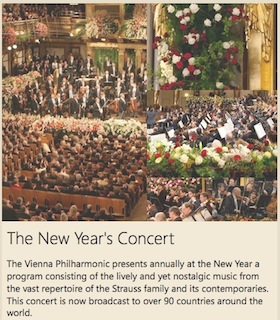For the first time in three years, William Osborne, an expert on the sociology of German-speaking orchestras, has posted an update about the latest developments at the VPo. “It’s the most positive I’ve ever written,” he tells me. Which is saying a lot when you know how critical he’s been of the orchestra’s all-male ideology in the past. As I’ve previously reported:
Much has changed since then, in large measure because Osborne and the International Alliance for Women in Music mobilized a far-flung band of feminists whose protests, which began in 1995, eventually forced the orchestra to admit women into its ranks. Although the changes have been slow in coming, “the last three years have brought some important gains in the number of women in the Vienna State Opera Orchestra/Vienna Philharmonic,” Osborne writes. “The Opera formation now employs fourteen women, and ten of them have been tenured into the orchestra’s Philharmonic formation.” He notes further:Osborne contended that the Vienna Philharmonic’s belief in male supremacy was gender bias of the worst sort, rooted in a historical rationale of national identity and cultural purity, and that its exclusionary policy was part of an intolerable racist heritage. The orchestra’s discriminatory practices, he argued, cast such a pall over its considerable artistic achievement that the institution has turned out to be the shame, not the pride, of Western civilization.
Between 2012 and 2015, the State Opera Orchestra hired three new women violinists, and a woman principal bassoonist. The standards have been very high. Two of these violinists are winners of prestigious international solo competitions, and bassoonist Sophie Dartigalongue is also an active soloist. Ms. Dartigalongue’s employment as principal bassonist is especially notable because women in principal positions are rare in many orchestras. The Chicago Symphony, for example, has had only two in its entire history.
“Another sign of progress,” he writes
is that Patricia Koll has been made one of the leaders of the second violin section. Her father Heinrich is one of the orchestra’s solo violoists. The Vienna Philharmonic has a long tradition of hiring the sons of the orchestra’s members.They feel this helps maintain the orchestra’s performance practices. The Kolls illustrate that father-daughter traditions can exist as well. And perhaps someday, mother-daughter continuities will also be seen. Patricia was seven years old when the protests began twenty years ago.
Additionally, despite great reluctance, the orchestra has come clean about its Nazi past. Osborne, an expatriate American composer who has lived in Germany for three decades, notes that the VPo:
has allowed scholars over the last three years to document its history during the Third Reich. Thirty-two articles based on this research, most of which have been translated into English, can now be downloaded from the Vienna Philharmonic’s website. The orchestra had kept its archives largely closed until 2012, so little was widely known about the orchestra’s activities during this period. This change of policy was caused to a considerable degree by the protests against the orchestra’s gender and racial discrimination, which included calls for the orchestra to more fully address its Nazi history.
But Osborne’s update is not without serious criticism. The orchestra continues a longstanding policy of excluding Asians musicians because it has “traditionally felt that such individuals would destroy the ensemble’s image of Austrian authenticity.”
For the last 40 years, around a quarter to a third of the students at Vienna’s University of Music have been Asian, but none have ever been hired even though many have reached the highest professional standards. People who are fully Asian and have Asian family names are found in all of the top Western European and American orchestras, except the Vienna Philharmonic. The Chicago Symphony, for example, has 18 in the violins and violas alone. Some members of the Philharmonic have openly expressed beliefs that Asians, regardless of their training and background, make music differently than Westerners — a perception that is not uncommon in German-speaking orchestras.
Osborne believes, however, that “as vestiges of cultural racism … become evermore anachronistic, it seems likely that the Vienna Philharmonic will eventually make the same progress in hiring Asians that it has with women.”
Well … maybe in another another 20 years.





